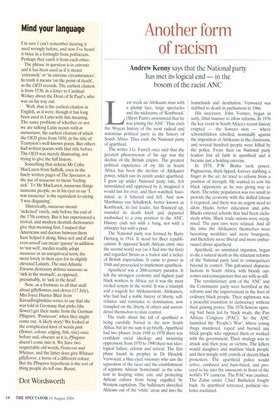Another form of racism
Andrew Kenny says that the National party has met its logical end — in the bosom of the racist ANC Last week an Afrikaans man with a plump face, large spectacles and the nickname of `Kortbroek' (Short Pants) announced that he was joining the ANC. Thus ends the 90-year history of the most radical and notorious political party in the history of South Africa. Thus ends the National party of apartheid.
The writer J.G. Farrell once said that the greatest phenomenon of his age was the decline of the British empire. The greatest political experience of my life in South Africa has been the decline of Afrikaner power, which saw its zenith under apartheid. I grew up under National party rule, felt intimidated and oppressed by it, imagined it would last for ever, and then watched, fascinated, as it faltered and fell. And now Marthinus van Schalkwyk, better known as Kortbroek, its last leader, has flounced up, sounded its death knell and departed unabashed to a cosy position in the ANC, History ends not with a bang, not with a whimper but with a pout.
The National party was formed by Barry Hertzog in 1914. It stood for Boer republicanism. It opposed South African entry into the second world war (as it had into the first) and regarded Smuts as a traitor and a lackey of British imperialism. It came to power in 1948 and proceeded to implement apartheid.
Apartheid was a 20th-century paradox. It left the strongest economy and highest paid black workers in Africa, yet it was the most reviled system in the world. It was a triumph and a tragedy for Afrikanerdom. Afrikaners, who had had a noble history of liberty, selfreliance and resistance to domination, now trampled on the liberty of others and surrendered themselves to state control.
The truth about the fall of apartheid is being carefully buried in the new South Africa, but let me sum it up briefly. Apartheid had two phases: from 1948 to 1970 there was confident racial ideology and mounting oppression; from 1970 to 1990 there was ideological failure, reform and retreat. The first phase found its prophet in Dr Hendrik Verwoerd, a blue-eyed visionary who saw the separation of the races and the establishment of separate African 'homelands' as the solution to keeping white rule and protecting African culture from being engulfed by Western capitalism. The bulldozers shovelled Africans out of the 'white' areas and into the homelands and destitution. Verwoerd was stabbed to death in parliament in 1966.
His successor, John Vorster, began in surly, fitful manner to allow reforms. In 1976 the key event in South Africa's recent history erupted — the Soweto riots — where schoolchildren rebelled, nominally against the imposition of Afrikaans in the classroom, and several hundred people were killed by the police. From then on National party leaders lost all faith in apartheid and it became just a holding exercise.
In 1978, P.W. Botha took power. Pugnacious, thick-lipped, forever stabbing a finger in the air, he tried to reform from a position of strength. He wanted to cow his black opponents as he was giving way to them. The white population was too small to provide the economy with the skilled labour it required, and there was an urgent need to allow blacks better education and jobs. Blacks entered schools that had been exclusively white. Black trade unions were recognised. The pass laws were relaxed. And all the time the Afrikaners themselves were becoming wealthier and more bourgeois, and therefore more liberal and more embarrassed about apartheid.
Apartheid, an unnatural organism, began to die a natural death as the reluctant reforms of the National party lead to consequences beyond its control. This galvanised disparate factions in South Africa, with bloody outcomes and consequences that are with us still.
The revolutionary arm of the ANC and the Communist party were horrified at the reforms and the improvement in the lives of ordinary black people. Their nightmare was a peaceful transition to democracy without their gaining power. The 1976 Soweto uprising had been led by black rivals, the Pan African Congress (PAC). So the ANC launched the 'People's War', where young thugs murdered, raped and burned any black people who opposed them or worked with the government. Their strategy was to attack and then pose as victims. The killers would slaughter and mutilate black people and then mingle with crowds of decent black protesters. The apartheid police would arrive, confused and ham-fisted, and proceed to lay into the innocents in front of the world's TV cameras. The PAC was crushed. The Zulus under Chief Buthelezi fought back. As apartheid retreated, political violence escalated.
The National party under Botha lashed about wildly but was never willing to forsake all decency for total oppression. With the forces that Botha had at his disposal, a Lenin, Hitler. Castro or Mugabe would easily have crushed all opposition if retaining power were the only goal. This was never the case with the Afrikaners. You only have to read Nelson Mandela's biography, Long Walk to Freedom, to see that apartheid was a relatively mild despotism, hedged in by respect for constitutionalism and fear of a Christian God.
Boer extremists declared (accurately) that reforms were the thin end of the wedge and hinted at violent resistance against them. White liberals separated into the cslideaways' (so termed by Jill Wentzel of the Liberal party) who turned a blind eye to ANC atrocities, and the steadfast. like Helen Suzman, who maintained liberal beliefs. Big business, as is its nature, began to make deals with the party it saw as the strongest power in the future, which was the ANC.
Events intervened. In 1989 communism, which was the main reason for fearing the ANC, collapsed. Botha had a stroke. In February 1990, the new leader of the National party, F.W. de Klerk, made his famous speech, releasing Nelson Mandela, unbanning the ANC and effectively ending apartheid. Four years of negotiation led to democratic elections in April 1994. The ANC won 63 per cent of the vote, the National party 20 per cent. Nelson Mandela became president of South Africa. What then for the National party? At first it ruled in a coalition with the ANC. with de Klerk as a deputy president, but withdrew from it in 1996. De Klerk retired soon afterwards. In 1997, the National party elected a new leader and a new type of man, van Schalkwyk, devoid of ideology but not of ambition. A Stellenbosch professor, noting the lack of gravitas, called him `Kortbroek' and the name stuck.
The National party changed its name to the New National party (NNP) but did not know how to change its purpose. It was no longer a racist party but had no idea what it stood for. Whites abandoned it for the growing Democratic party under Tony Leon, which opposed the new racism and power mania of the ANC. The main support for the NNP came from the coloured people of the Western Cape, who throughout the apartheid years had feared the blacks more than they resented the whites.
In the 1999 election the NNP got 7 per cent of the vote. In 2000 Kortbroek led it into a coalition with the Democratic party, which became the Democratic Alliance. He declared, 'When I look at the ANC I am saddened — angered — by what I see. Many people put their trust in the ANC, but the ANC failed them, and continues to fail them.' In 2001, he led his party away from this alliance and into one with the ANC. He declared, 'We are going to work with the ANC to make the country a success and we are not going to be apologetic about it.' He is not apologetic about anything, including the collapse of his party. In the election this year, the NNP got 1.7 per cent of the vote.
Kortbroek is a cross between Billy Bunter and the Vicar of Bray, with all the latter's self-righteousness and instincts for survival. As he changes his stance from condemning the ANC to praising it, from admiring Tony Leon as a generous and far-sighted leader to denouncing him as a mean-minded bigot, from one strong political view to the opposite one, he does not change his tone, which is ever eloquent and reasonable.
The ANC needed the NNP for one reason only, to deliver the coloured vote and so give them power in the Western Cape. This has come to pass and Kortbroek has been rewarded with the post of minister of the environment and tourism. The last of the National party leaders can now be seen on television standing next to a polluted stream in a squatter camp, solemnly promising a better life for the people.
Finally, he has taken the expected step of joining the ANC and in effect ending the National party dynasty. Some commentators are saying that Verwoerd must be turning in his grave. I am not so sure about that. The thinking of the ANC, with its obsessions about racial ideology and state control, closely resembles that of the National party of old. Kortbroek is no racist but he can live with racial ideology. As a matter of fact, he can live with any ideology you please.



























































 Previous page
Previous page